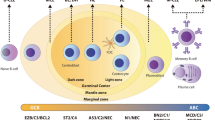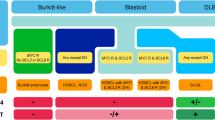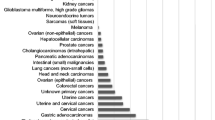Abstract
Background: It has been proposed that clones of tumor cells acquire higher metastatic potential as a result of specific genetic alterations. This study was designed to determine the role of the c-met protooncogene in systemic spread by comparing the loss of the c-met protooncogene between primary and metastatic breast carcinomas.
Methods: Only patients who had not received chemotherapy or radiotherapy in the preceding 6 months were included in this study. Histologically proven malignant tissue was obtained from the primary tumor, involved nodes, and distant metastatic and recurrent tumors of patients with breast carcinomas. Allelic loss of the c-met protooncogene in tumor tissue was determined by Southern blotting using a polymerase chain reaction-generated 347-bp human met-H probe. Restriction digestion was performed usingTaq I andMsp I, with the patient's lymphocyte DNA as controls.
Results: Of 52 patients, lymphocyte DNA from 36 patients was heterozygous for the c-met protooncogene (69% informative). Forty-six tumors from these 36 patients were analyzed. Four of 30 primary tumors (13%) showed allelic loss of c-met. Of the nine nodal metastases examined, three (33%) showed allelic loss of the c-met protooncogene. Of seven distant metastatic breast tumors or recurrent disease, two (29%) showed allelic loss (both in patients with skin metastasis in the chest wall).
Conclusions: Allelic loss of the c-met protooncogene was detected in both primary (13%) and metastatic sites (31%) of breast cancer. Although a higher proportion of allelic loss of c-met was noted in nodal and distant/recurrent disease, the difference when compared with the primary tumor was not statistically significant. These findings indicate a limited role of the c-met protooncogene in breast cancer metastases.
Similar content being viewed by others
References
Rosen PP, Groshen S, Saigo PE, Kinne DW, Hellman S. Pathological prognostic factors in stage I (T1N0M0) and stage II (T1N1M0) breast carcinoma: a study of 644 patients with median follow-up of 18 years.J Clin Oncol 1989;7:1239–51.
Fisher B, Redmond C, Fisher ER, et al. Ten year results of a randomized clinical trial comparing radical mastectomy and total mastectomy with or without radiation.N Engl J Med 1985;312:674–81.
Fidler IJ, Kripke ML. Metastasis results from pre-existing variant cells within a malignant tumor.Science 1977;197:893–5.
Hart IR, Saini. Biology of tumor metastasis.Lancet 1992;339:1453–7.
Steeg PS, Bevlaqua G, Kopper L, Thorgeirsson UP, Talmadge JE. Evidence for a novel gene associated with low tumor metastatic potential.J Natl Cancer Inst 1988;80:200–4.
Higuchi R. Perkin Elmer/Cetus Newletter Amplifications 1989, 2:1.
Park M, Gonzatti-Haces M, Dean M, et al. TheMet oncogene; a new member of the tyrosine kinase family and a marker for cystic fibrosis.Cold Spring Harb Symp Quant Biol 1986;51:967–75.
Finklestein SD, Sayegh R, Christensen S, Swalsky PA. Genotypic classification of colorectal adenocarcinomas.Cancer 1993;71:3827–38.
Bergh J, Norberg T, Sjorgren S, Lindgren A, Holmberg L. Complete sequencing of the p53 gene provides prognostic information in the breast cancer patients, particularly in relation to adjuvant systemic therapy and radiotherapy.Nat Med 1995;1:1029–34.
Bieche I, Champeme MH, Matifas F, Hacene K, Callahan R, Lidreau R. Loss of heterozygosity on chromosome 7 and aggressive breast cancer.Lancet 1992;339:139–43.
Devilee P, Van Vilet M, Van Sloun P, et al. Allelotype of human breast carcinoma: a second major site for loss of heterozygosity is on chromosome 6q.Oncogene 1991;6:1705–11.
Cooke A, Kim YT, Harvey TI, Connor JM, Nagy J, George WD. Comment.Lancet 1993;341:1289.
Park M, Dean M, Kaul K, Braun MJ, Gonda M, Vande Woude G. Sequence ofMET protooncogene cDNA has features characteristic of the tyrosine kinase family of growth factor receptors.Proc Natl Acad Sci U S A 1987;84:6379–83.
Chan M-LA, Rubin JS, Bottaro DP, Hirshfield DW, Chedid M, Aaronson SA. Identification of a competitive HGF antagonist encoded by an alternative transcript.Science 1991;254:1382–5.
Weidner KM, Sachs M, Birchmeier W. TheMet receptor tyrosine kinase transduces motility, proliferation, and morphogenic signals of scatter factor/hepatocyte growth factor in epithelia cells.J Cell Biol 1993;121:145–54.
Suzuki K, Hayashi N, Yamada Y, et al. Expression of c-met protooncogene in human hepatocellular carcinoma.Hepatology 1994;20:1231–6.
Grigioni WF, Fiorentino M, D'Errico A, et al. Overexpression of c-met protooncogene product and raised Ki67 index in hepatocellular carcinoma with respect to benign liver conditions.Hepatology 1995;21:1543–6.
Rahimi N, Saulnier R, Nakamura T, Park M, Elliot B, Role of hepatocyte growth factor in breast cancer: a novel mitogenic factor secreted by adipocytes.DNA Cell Biol 1994;13:1189–97.
Khine K, Smith DR, Goh HS. High frequency of allelic deletion on chromosome 17p in advanced colorectal cancer.Cancer 1993;73:28–35.
Author information
Authors and Affiliations
Rights and permissions
About this article
Cite this article
Ng, EH., Pey, HB., Law, HY. et al. Loss of c-met protooncogene in primary and metastatic sites of breast cancer. Annals of Surgical Oncology 4, 499–502 (1997). https://doi.org/10.1007/BF02303675
Received:
Accepted:
Issue Date:
DOI: https://doi.org/10.1007/BF02303675




